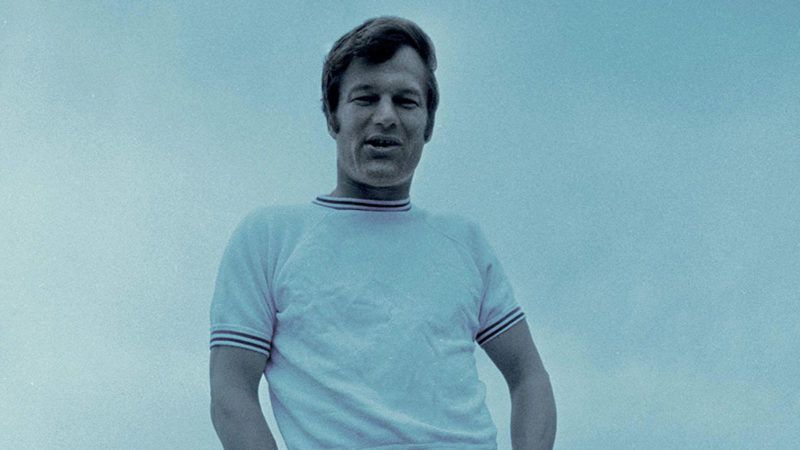Into the Dugout
Jim Bouton pulled back the curtain on the MLB and changed the perception of sports forever.

Bouton: The Life of a Baseball Original, by Mitchell Nathanson, University of Nebraska Press, 409 pages, $34.95
The best book ever written about baseball is Ball Four, Jim Bouton's irreverent look at the 1969 baseball season. Over the course of the year, Bouton bounced from the New York Yankees, his club of seven seasons, to the minor leagues to the short-lived Seattle Pilots to the Houston Astros, trying to hang on as a big-league pitcher several years past his prime. Edited by sportswriter Leonard Shecter and published in 1970, Ball Four is a work of genuine iconoclasm, the first widely read account of life in the Major Leagues that was not written in hushed tones.
By the time Bouton's book was released, Major League Baseball had spent decades as the grand dame of American professional sports. Perhaps no aspect of American life was written about as reverentially as the "national pastime," a term that the sport's thoroughly sentimental partisans had been using to describe it since the Buchanan administration. The elevation of baseball stars to the simultaneous status of celebrity and role model became particularly pronounced during the 1920s, when sportswriters like Grantland Rice and future baseball commissioner Ford Frick turned Babe Ruth into a cultural icon of virtually unprecedented stature. The baseball heroes of subsequent generations were cast in a similar guise, presented in all forms of media as figures of towering cultural significance and characteristic of all that was good in American life.
Bouton's book was radically different—a sports book for an era when institutions of all kinds were coming under skeptical scrutiny. Instead of a familiar, cloying I'm-getting-paid-to-play-a-kid's-game narrative, Bouton discussed his contract disputes and his desire to get paid his market value. Writing in diary form, he spoke out of school on professional athletes' everyday lives, dishing on their petty jealousies, lecherousness, boozing, and use of amphetamines to make it through the 162-game grind. Despite the late 1960s' reputation for cultural radicalism, Bouton showed that the spirit of the times had yet to reach Major League Baseball. He criticized the groupthink he found in baseball locker rooms, deriding his teammates' lack of interest in cultural and political matters—and their acquiescence to team-owner paternalism by refusing to push for better pay or for more control over the conditions of their employment.
Needless to say, Major League Baseball was not pleased with Bouton's presentation of the game. Commissioner Bowie Kuhn went so far as to try to get Bouton to sign a document that said his book was a work of fiction. Bouton refused. But even if he had signed, the cat would have been out of the bag.
The behind-the-scenes sportswriting that Bouton pioneered has been copied thousands of times over the past five decades, by journalists, by documentarians, by Bouton's fellow memoirists. Just recently, the picaresque Chicago Bulls documentary series The Last Dance adopts a beyond-the-box-score tone that would have been unimaginable before Ball Four. Athletes who have used the various social media platforms to express their views on a wide range of issues are working in a tradition that Bouton pioneered.
By the time I spoke with the Ball Four author in 2009—he was the first person I ever interviewed—I was intimidated by his legend, having transformed him in my head into a ball-playing Hunter S. Thompson. But he was generous with his time and couldn't have been more gracious to a young writer. He spoke frankly with me about steroids in baseball, taxpayer financing of stadiums, and athletes' interactions with the press.
The forthrightness that came across in that conversation is evident in Mitchell Nathanson's account of the Ball Four author's life. Nathanson is a law professor at Villanova who has written several baseball histories, and Bouton: The Life of a Baseball Original is one of the best baseball biographies in recent memory. Nathanson is a fantastic storyteller, capable of juxtaposing Bouton's recollections with those of his contemporaries and situating these stories within their historical context. While researching the book, he spent a significant amount of time with Bouton in the final years of his life (Bouton died in 2019), which contributes to the depth with which he renders his subject.
The Bouton that Nathanson evokes is equal parts traditional and subversive. Bouton challenged the status quo of the "national pastime," unmooring the men who made their living in baseball from the mythology of the game. He brought athletes down from Mount Olympus and showed them to be people, deeply flawed and deeply funny, worthy of informed admiration rather than thoughtless worship. Bouton embraced and was embraced by the era's counterculture, becoming an exemplar of the liberated, socially conscious athlete amid what sports reporter Howard Cosell called the "jockocracy."
But at the same time, he was a throwback: an old-fashioned hustler, part showman and part entrepreneur. After being blackballed from the Major Leagues, Bouton found many ways to parlay his notoriety and smarts into a lucrative post-baseball career. He worked as a sportscaster in New York and appeared in several films. He proved a shrewd investor in real estate and became genuinely wealthy as one of the inventors of Big League Chew gum. All the while, Bouton was engineering a multiyear baseball comeback as a knuckleball pitcher, which culminated in a five-game return to the majors in 1978 for the Atlanta Braves. Bouton's best product proved to be the brand he created with Ball Four.


Show Comments (75)